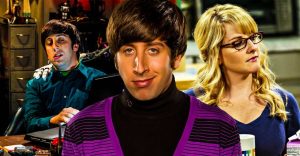Scream: 5 Horror Tropes It Subverted (& 5 It Adhered To)

Director Wes Craven and screenwriter Kevin Williamson beautifully satirized the tropes of slashers with their meta 1996 classic Scream. Neve Campbell challenged the stereotypes of female characters in horror movies, while the movie itself revitalized the genre. As the story of a masked serial killer picking off high schoolers, Scream is a pretty standard slasher, but it also upends a lot of the usual clichés of those movies.
Williamson’s darkly comic script subverts plenty of familiar tropes in a self-aware critique of the genre, but also adheres to enough of them to deliver the goods for slasher fans.
10 Subverted: The Characters Have Never Seen A Horror Movie

In most horror movies, the characters have never seen a horror movie. The survivors of a zombie apocalypse don’t know what zombies are, friends who stay at a cabin in the woods don’t realize there are dozens of movies about that exact scenario taking a sinister turn, and the victims of a masked killer have never caught a slasher late one night on cable.
The most meta element of Scream is that its characters are actually familiar with the history of horror cinema. In the opening scene, the Ghostface killer establishes this right away by asking Drew Barrymore, “What’s your favorite scary movie?” Randy even gives his friends a crash course in how to survive a horror movie.
9 Adhered To: Look Behind You!

In a lot of horror films, audiences will find themselves imploring the characters on-screen to turn around because there’s a monster right behind them and they have no idea.
While Randy is watching a slasher movie at a party, he can’t believe that the unsuspecting victim on-screen doesn’t realize there’s a killer approaching behind them. Meanwhile, he’s completely oblivious to the real-life killer approaching him from behind.
8 Subverted: The Final Girl

Almost every slasher movie has a “final girl.” She’s usually a studious virgin who doesn’t like to party and, because she was well-behaved, the movie lets her survive the killer’s wrath. In Scream, Sidney does get good grades, doesn’t go to many parties, and at the beginning of the movie, she is a virgin.
But by the end of the movie, she’s not. She has sex with her boyfriend for the first time on-screen and, for perhaps the first time in the horror movie history, she’s still smart enough to outwit the killer. And she’s not the final girl, because four other characters survive.
7 Adhered To: Everyone Is A Suspect

In some slasher movies, the audience knows who the killer is from the beginning. Halloween begins from Michael Myers’ perspective. Other times, the killer’s identity is unknown and viewers aren’t sure which one of the characters is the killer until the end.
In Scream, the audience is kept guessing about the identity of the killer until the shocking reveal that there are actually two of them: one who seemed like the obvious choice and one who was seemingly innocent.
6 Subverted: One Killer

Most slashers stick to one antagonist: Halloween has Michael Myers, A Nightmare on Elm Street has Freddy Krueger, Friday the 13th has Jason Voorhees (in the sequels, anyway; in the first movie, it’s his mom), The Texas Chain Saw Massacre has Leatherface, and Candyman has, well, Candyman.
Throughout the majority of Scream, fans are led to believe that there’s only one Ghostface killer, but a final plot twist reveals that there are actually two Ghostface killers, giving each other an alibi.
5 Adhered To: Useless Cops

In most slashers, the police prove to be useless in dealing with the killer, leaving the final girl with the unenviable task of bringing a sadistic serial killer to justice.
The cop character in Scream is Tatum’s brother, Dewey, a sheriff’s deputy, and when he arrives on the scene, he’s promptly stabbed in the back and put out of commission until the end of the movie.
4 Subverted: Sexually Active Characters Die

One of the tropes that Scream specifically identifies, via horror buff Randy, is that sexually active characters die and only abstinent characters survive. However, Sidney has sex (with the killer, no less) and still survives.
The killer, on the other hand, does die at the end, so it technically adheres to this one, too, but the killer dying at the end is kind of a prerequisite — unless sequels are in order, that is.
3 Adhered To: Masked Killer

The villain of a slasher movie will often wear a mask that is specific to them and can therefore be used for brand recognition if it becomes a franchise. These include Jason Voorhees’ hockey mask, Michael Myers’ Shatner mask, and Leatherface’s extensive collection of masks.
Since the Scream franchise’s Ghostface killer is just an identity adopted by various killers (including two different killers in the first movie alone), the mask is what ties them all together.
2 Subverted: The End…Or Is It?

A lot of slashers will end with a final stinger, like A Nightmare on Elm Street’s optimistic final scene revealing itself to be a dream or Jason Voorhees’ decomposing corpse jumping onto Alice’s boat at the end of Friday the 13th. This leaves the movie unnervingly open-ended, but more importantly, it opens the door for a sequel.
At the end of Scream, the killers are caught, Dewey makes it to an ambulance, Gale Weathers reports the events of the night, and no sequel seems to be in sight. Of course, there was a sequel, but it concerned a copycat killer.
1 Adhered To: Twist Ending

Plenty of great horror movies end with a shocking plot twist: Psycho, Night of the Living Dead, Saw, The Wicker Man, The Descent, The Ring, The Mist, The Others, The Sixth Sense, Orphan — the list goes on.
Scream adheres to this with a double whammy of twists: not only are there two killers, but one of them is Sidney’s boyfriend!
About The Author


















